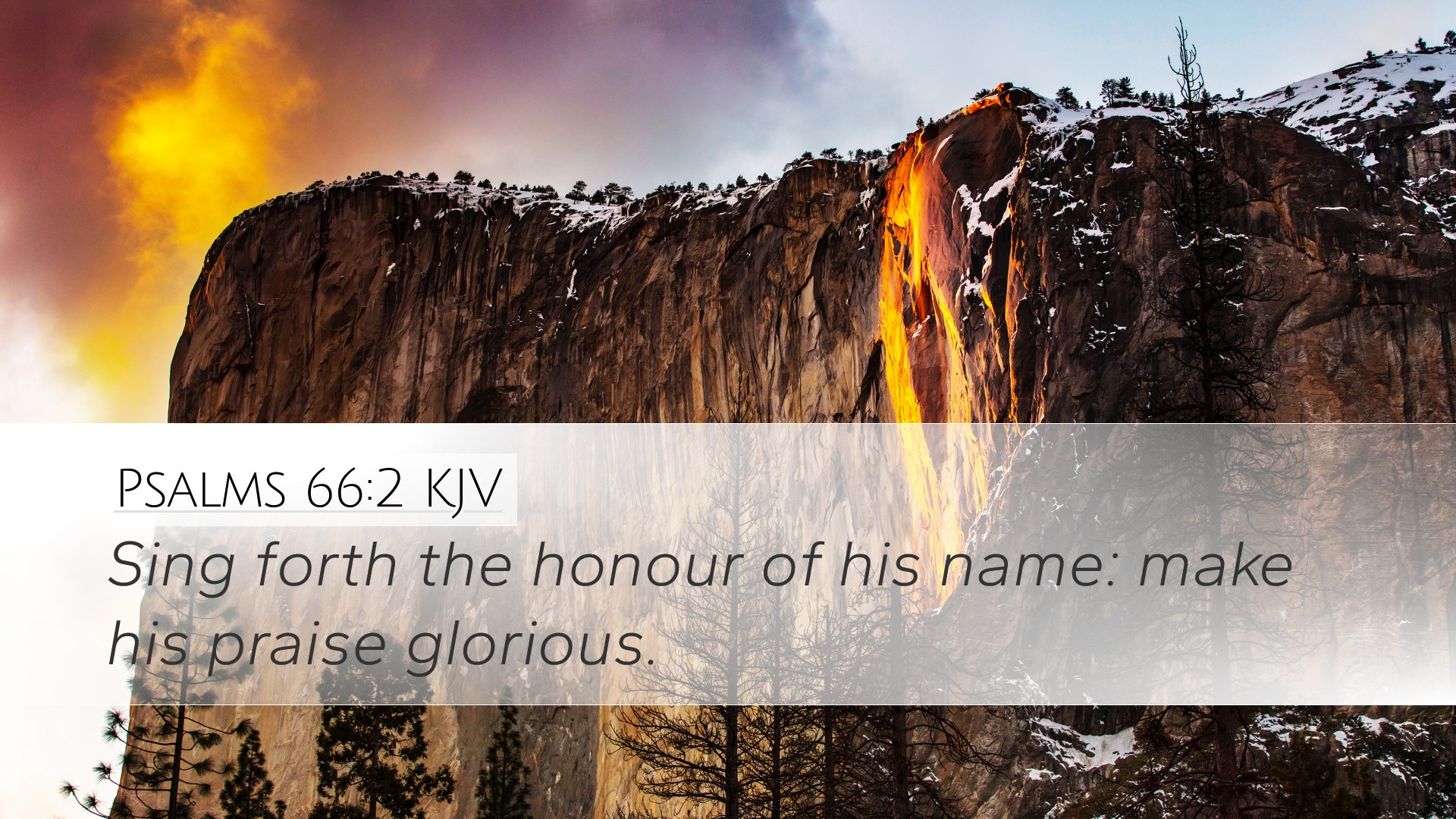Psalms 66:2 - Commentary Overview
Verse: "Sing forth the honor of his name: make his praise glorious." (Psalms 66:2)
Introduction
Psalms 66 serves as a profound expression of worship and praise to God, encapsulating the dual themes of gratitude for His past deeds and a call to acknowledge His greatness. Verse 2 particularly emphasizes vocal worship and the intrinsic value of exalting God's name. The following commentary synthesizes insights from various public domain sources to unpack the rich implications of this verse.
Exegesis and Theological Insights
Matthew Henry's commentary notes that the Psalmist exhorts the congregation not only to sing but to specifically “sing forth the honor of his name.” This imperative illustrates that worship must not be casual but should rather be filled with purpose, aiming to magnify God's honor and glory.
Henry further elaborates on the concept of singing as a vital expression of praise. He mentions that vocalizing our adoration serves a dual purpose: it lifts our hearts in worship and serves as a testament to others of God's grandeur. In doing so, worship becomes both a personal and communal act.
Call to Worship
Albert Barnes emphasizes that this verse acts as a clarion call for all creation to participate in the exaltation of God. He interprets the phrase “make his praise glorious” as an instruction to elevate the standard of worship. The quality of worship reflects our understanding of God’s nature; thus, believers are urged to approach worship with a heart dedicated to honoring God.
Praise and Honor of God
Adam Clarke reflects on the direct relationship between worship and the attributes of God. By recognizing the 'glorious' aspects of His nature—His power, mercy, and faithfulness—believers can respond in kind with heartfelt praise. Clarke argues that true worship is birthed from a deep understanding of who God is, and how He interacts with His creation.
Application for Worship
- Cultivating a Spirit of Worship: This verse invites believers to cultivate a spirit of worship that is intentional and steeped in reverence. Each act of praise should stem from an understanding of God’s character.
- Community Engagement: The communal aspect of praising God as expressed in Psalms 66 highlights the corporate nature of worship. Local churches are encouraged to gather and elevate their praises collectively, acknowledging the shared testimony of God’s deeds.
- Vocal Expression: The call to “sing forth” reinforces the importance of vocal worship. Pastors and leaders are reminded to foster environments where congregants feel encouraged to express their praises audibly and joyfully.
Historical Context and Significance
Historically, the Psalms were recited during various Jewish celebrations and solemn assemblies. This particular Psalm likely carries a rich tradition of use in temple worship, designed to gather God’s people in remembrance of His providence and mercy.
As such, Psalms 66:2 serves not only as a call to individual worship but also as a communal gathering point, calling the people of God to remember His works and respond with a chorus of exaltation. The historical lens through which this Psalm is read enhances the understanding that worship has always been a central facet of the believer’s life.
Summary and Conclusion
In summary, Psalms 66:2 encourages believers to extend their praise to God by celebrating His greatness and honor. Drawing from the insights of Henry, Barnes, and Clarke, we see that worship is an intentional act that should be both personal and communal, characterized by a deep reverence and acknowledgment of God’s divine attributes.
This verse challenges contemporary worshipers to elevate their practice, ensuring that their praises are directed towards glorifying God in a manner befitting His majesty. In embracing this call, churches and individuals alike can enrich their worship experiences, continually pointing to the glory that belongs to God alone.


